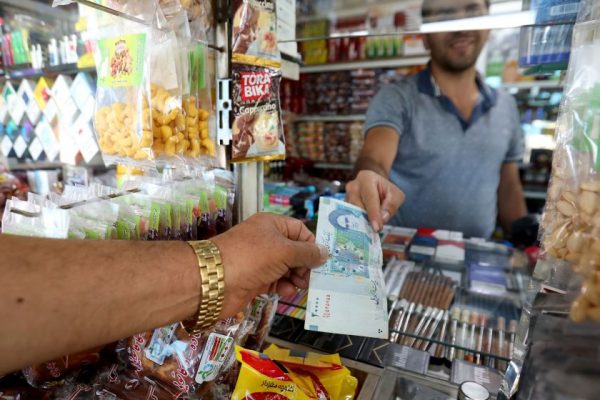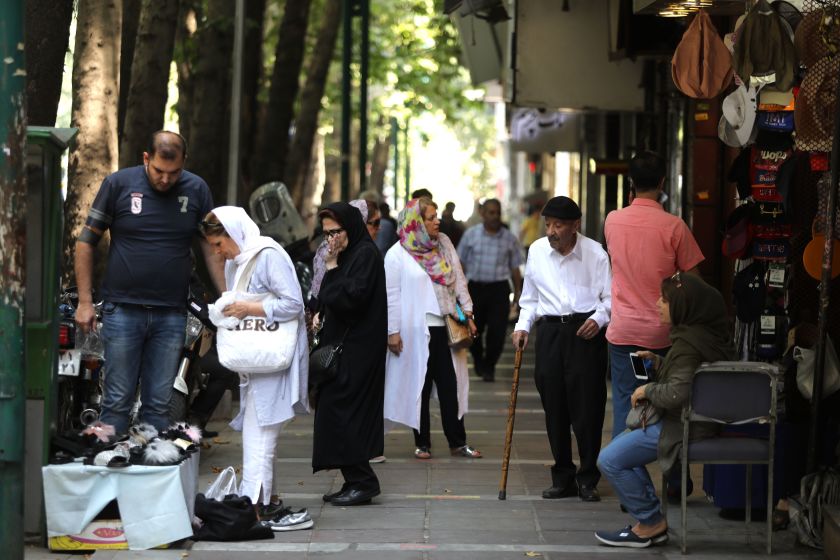Here’s what President Trump’s “maximum pressure” campaign of economic sanctions against Iran looks like for Shaghayegh Safari, a 38-year-old single mother who works as a typist at a magazine in Tehran.
Her water and gas bills rose 30% over the last two years. The monthly rent for her one-bedroom apartment jumped from $75 to $240.
“My income is not enough to buy decent clothes for myself and my child anymore,” she said. “I used to buy brand-name clothes, but now if I buy something it’s secondhand.”
Unable to keep up with the cost of living, Safari recently moved into her mother’s one-bedroom apartment with her 10-year-old daughter.
Her experience is typical, as Iran’s most vulnerable citizens suffer the brunt of a drop in foreign investments and oil exports, massive inflation, a plummeting national currency and rising prices for food, clothing and medicine.

The sanctions have been felt heavily on the streets of Iran despite statements from U.S. officials that the “maximum pressure” campaign does not affect ordinary Iranians.
(Atta Kenare / AFP-Getty Images)
“People in the private sector are making fortunes in real estate or the financial and trade sectors and they are gaining the lion’s share of the economy while the working class and poor in the cities are feeling the soaring prices of commodities on their shoulders,” said Fariborz Raisdana, an economist in Tehran.
The United States imposed the sanctions targeting the oil, energy, banking, metals and shipping industries last year after withdrawing from the landmark 2015 nuclear agreement that had given Iran sanctions relief in exchange for measures aimed at preventing it from obtaining materials that could be used to produce a nuclear weapon.
In May, when Iran announced that it would stop complying with parts of the deal, the U.S. added sanctions to the iron, steel, aluminum and copper industries and revoked waivers that had allowed Iran to ship to China and Syria. In June, after Iran shot down a U.S. spy drone near the Strait of Hormuz, the Trump administration hit the country with even more sanctions.
The other signatories — Russia, France, China, Germany and Britain — have remained in the accord and not reimposed sanctions they had lifted. However, severe restrictions imposed by the U.S. on Iran’s banking and financial institutions have made it difficult for the international community to do business with Iran.
U.S. officials have said its sanctions are aimed at curbing Iran’s military power and its support of the Houthi rebels in Yemen, Hezbollah in Lebanon and other militant groups in the Middle East.
At the Group of 7 summit in France on Monday, Trump and other leaders set off speculation that the U.S. was planning a presidential summit with Iran. But Iranian President Hassan Rouhani suggested in a speech Tuesday that such a meeting would be pointless unless the U.S. first lifted sanctions.
Brian Hook, the U.S. special envoy for Iran, told reporters in June that the sanctions were working, preventing Iran from acquiring nuclear weapons and forcing it to cut military spending by 29% this year.
Oil exports, Iran’s main source of income, have fallen 80% since the sanctions were put into place, and the International Monetary Fund predicts that Iran’s economy will shrink by 6% this year.

Severe restrictions imposed by the U.S. on Iran’s banking and financial institutions have made it difficult for the international community to do business with Iran.
(Atta Kenare / AFP-Getty Images)
But Iranian officials and various experts said that didn’t necessarily mean Iran’s economy would fall apart.
“Iran has learned how to mitigate the damages that are associated with sanctions,” said Steve Hanke, an economics professor at Johns Hopkins University. “Yes, it costs something, but they retain stability.”
Indeed, Iran has ample experience with U.S. sanctions, having been subjected to them continuously since the Islamic Revolution in 1979. The U.S. eased off only twice: once in the late 1990s, then again after the nuclear accord was signed.
After the Obama administration placed stringent sanctions on Iran in 2012, Supreme Leader Ayatollah Ali Khamenei enacted policies to support local industries and reduce dependence on oil exports by increasing trade with Iraq, Afghanistan and other neighbors.
Those endeavors, known as Iran’s “resistance economy,” are helping guide the government of Rouhani. The country has increased domestic production of hard-to-import goods such as medicine and appliances.
The annual inflation rate declined from 50% in June to 48% last month, and the rial rose 20% against the dollar.
“Under the heaviest record of sanctions in the contemporary history of Iran, any government could have bent down and compromised to the pressures imposed by America,” said Hamidreza Taraghi, a political analyst who is close to the supreme leader’s office. “But Rouhani has managed to help stabilize the country, even though it took a lot to make ends meet.”
The sanctions, however, have been felt heavily on the streets of Iran, despite statements from U.S. officials that the “maximum pressure” campaign does not affect ordinary Iranians.
No longer able to afford fresh food, some Iranians in middle-class neighborhoods in Tehran have resorted to buying withered cucumbers and rotting tomatoes, grapes, apples and peaches that grocery store salesmen put aside every day at dusk.
“My clients are buying less and are more frugal,” said Ali Sharifi, the 33-year-old owner of a grocery store, where in the last year prices have risen more than 70%.
He said he has had to change his own spending habits: “I have a child in preschool and I can no longer take my family out to eat in a decent restaurant. Instead we buy the cheapest fruits or clothes.”
Majid Taleghani, a publisher and bookstore owner downtown, said the skyrocketing price of paper has raised the price of books and hurt his business.
“Books are not affordable for most people, so people prefer to watch TV and not read books,” he said.
A major challenge for the government is preventing such frustrations from evolving into popular unrest.
“If Iran is safeguarded by riots and protests, then in one or two years the wheels of Iran’s economy will be lubricated and it will stand on its feet firmly,” said Saeed Laylaz, a political economist who is close to the Rouhani government.
Some citizens have given up and abandoned Iran, and others hope to follow.
Farshid Andikjou, a 27-year-old former engineer, said he was studying English with the intention of finding a job abroad.
“Give me a good reason to stay in my country,” he said. “What will I achieve 10 years from now? I’d rather try my chance somewhere else.”
Times staff writer Etehad reported from Los Angeles and special correspondent Mostaghim from Tehran.